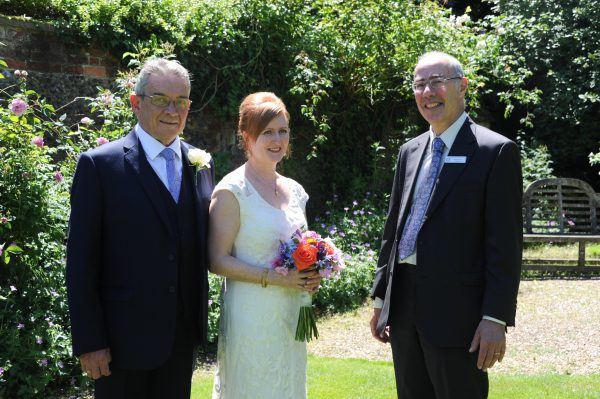
by Michael | Apr 11, 2022 | Blog
It’s understandable that I get asked what a civil celebrant actually is. I hope this blog will give you answers and paint a clearer picture, so you can see the potential benefits of working with one.
Here are a few questions I get all the time.
Are you a Humanist?
The short answer is “no”, but, in fact, I am much more than that. A Humanist is not supposed to include religious elements (or even the word “God”) in their service. However, if you want a secular service, you don’t need to resort to Humanists.
A civil celebrant can conduct a non-religious ceremony (as well as a part-religious or mixed-faith one). So that’s simple enough.
How much contact time is there between myself and officiant?
You will only meet the registrars for the first time at the marriage ceremony. The same may go for your vicar, if you’re having a church service. That’s not normally the case with a civil celebrant.
Apart from an introductory, discovery call (or visit) after your initial contact, you have access to your celebrant at all reasonable times from the time of booking until the day of the ceremony. So if you have queries or issues, it is easy to resolve them and you will feel more relaxed on the day because you will have established a close relationship with your celebrant.
How much control do I have over what goes into the service?
Only if you are working with a civil celebrant will you get free choice. Of course, you will also get guidance and advice, if wanted. Your ceremony will not be not standard or pre-ordained. You can have your own readings, vows or rituals – anything to make your ceremony personal and unique.
A church service is set in stone and the registrars offer a standard service, although sometimes they offer a modicum of choice.
So the content is basically unrestricted, if you work with a civil celebrant.
What about location and timing?
The church or Register Office ceremony is normally limited to “office hours”. A civil celebrant has no restrictions on when the ceremony can take place.
Likewise, with the location. A civil celebrant will conduct a ceremony for you almost literally anywhere. That’s clearly not the case with church weddings, and there are conditions to be complied with, in the case of Register Office services.
Hopefully, this will have clarified things a lot, but if you have further questions, please feel free to ask me!
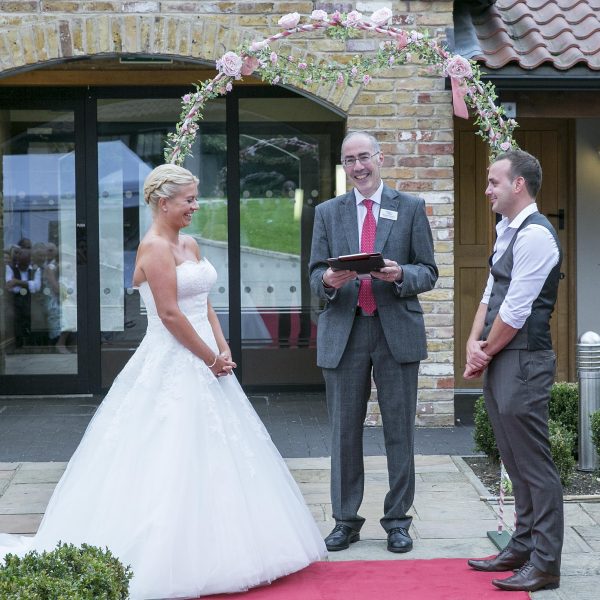
by Michael | Jun 20, 2017 | Blog
Your wedding ceremony should be the most important day of your life. Of course, you want to get it right. But what does it mean, to “get it right”?
There’s a lot of choices out there – possibly, more than you realise.

Religious, or not?
In many cases, the first decision you make together is whether or not you want a full religious ceremony. If not, do you want the other extreme? Of course, you can have a fully secular one, but maybe you prefer a mixture?
Anglican
If your choice is a Church of England ceremony, it’s easier if it’s your local church, but you can choose another one. Normally, the Vicar will be able to take you through everything. There’s no need to visit a Register Office either, as everything can be done in one ceremony. The cost of this starts at £456.
Church of Scotland
Church of Scotland ceremonies can take place anywhere and at any time (as long as your minister is in agreement). You don’t need to be a Scottish resident – but you do need to give between 15 days and three months’ notice at the Register Office.
Roman Catholic
You’ll need to take your baptism and confirmation certificates along to your priest at least six months before you wish to marry. If one of you hasn’t been baptised, your priest’s permission will be needed. You’ll be expected to attend marriage preparation classes, and to attend Mass for six weeks before your wedding day. Additionally, you need to go to your local Register Office to give notice and obtain your marriage licence.
Jewish
You will need to apply to the religious authorities and to the local Register Office. A religious ceremony will normally take place in a synagogue, but the rabbi may agree to conduct it elsewhere.
Secular
If you’re certain you want no religion, then you can opt for a humanist wedding. This will not be recognised in law, so you will still need to attend a Register Office ceremony beforehand. You can hold the humanist wedding wherever you wish, and can write your own vows and hire a humanist celebrant.
Just remember, that in a humanist ceremony, there should be no mention at all of God or even religious references, so if that’s a bit too extreme, you may want to consider a civil ceremony.
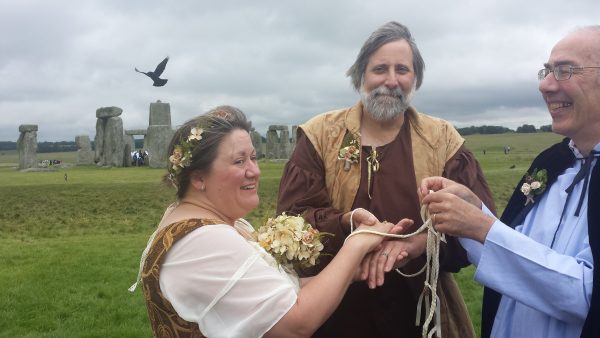 Civil Ceremony
Civil Ceremony
Like the humanist wedding, a civil wedding has no legal validity. It is simply a ceremony that is put together specially, usually by a professional civil celebrant. It should create a fabulous atmosphere and may well reflect the personalities and beliefs of the couple.
You can hold this wherever you like. If it’s in a property licensed for marriages, the registrars can be booked to come out (at an extra charge) and conduct the legal ceremony there. The civil ceremony can follow on straight afterwards. Otherwise, if not in licensed premises, you both need to go to the Register Office beforehand, with two witnesses. (This costs £35.)
Register Office
In addition to the celebrant charge, you will have to pay the registrars for the legal words to be pronounced. To organise this in the first case, go to the local Register Office to give notice. (If you’re not marrying locally, you’ll have to contact that particular Register Office to ensure they have somebody available on your chosen day.)
You’ll need ID, proof of address and nationality, any previous marriage documents and details of your venue. Once issued, the notice will be displayed for 15 days before you can legally marry. Your marriage licence is valid for a year.
You can find your civil celebrant via recommendation, Google – or at this website!
So I hope you see that there are other routes open to you than full religious or humanist. As long as the legal words are said and witnessed properly, everything else can be as original and personalised as you choose. You really can have the day of your dreams!

by Michael | Mar 7, 2017 | Blog
How do you keep everyone happy?!
I remember, from my days as a teacher, that, as soon as you had more than one child in the classroom, you had to accept the fact: you now had a mixed-ability class.
When faced with 30 pupils, say, do you aim at satisfying the needs of the cleverest ones, the weakest, or those in the middle? How can you please all of them even part of the time?
Such a dilemma is not unique to the classroom.
Let’s consider a wedding.
Religion
As soon as religion enters the mix, you are faced with questions. If it’s a wedding, should you opt for a full, religious service? Will that really be what the couple and their family want?
What about a secular or humanist service? No religion at all? You can bet that somebody is not going to like that.
You could go for a partly-religious ceremony. However, that runs the risk of not satisfying anybody at all (although it may depend how the service is constructed and presented).
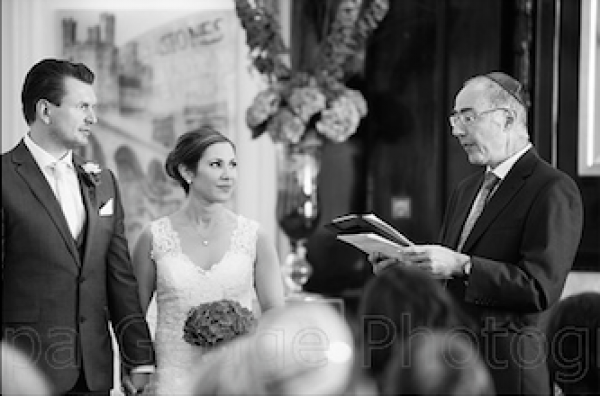
Source: Philippa Gedge photography
Compromise
As with a lot of the wedding planning, give-and-take is necessary. You’ll probably be struggling over the invitations already, so you may well be getting proficient at compromising.
Parameters
Given that you are highly unlikely to be able to keep everybody sweet, should you aim for the majority; should you placate parents; should you go your own way?
The first option risks being a bit wishy-washy. A mixed-faith service has got to be compiled and presented very professionally for it to work.
As for parents, even if they are financing the whole event, they should understand that it is still the fiances’ big day. That should be the bottom line. There’s nothing wrong with the couple including a religious element or two by way of compromise, but the ceremony should not be High Church (or equivalent), if the couple don’t want it.
As a civil celebrant, I have experience of one parent (only the one) who steamrollered the whole wedding – to the extent, that she threatened to boycott the event (and take quite a number of her relatives with her), if her choice was not respected over the couple’s. It takes all sorts …
If you decide to go your own way on your big day, you should be able to do so with a clear conscience. But if it is possible to include something that may placate those of different convictions, then it would be a nice gesture to do so.
The Best of all Worlds
I recently conducted a handfasting for a lovely couple. That was what Karl wanted; Martina had wanted a church wedding. They decided they would compromise (an encouraging start for a lifetime together!).
After the traditional church service, everybody moved to a wonderful barn for the handfasting, which I was to lead. The ceremony was nature-based, and required a few explanations for most guests.
The handfasting
We charged the circle (or space) before asking Air, Fire, Water and Earth to bless the couple. We drew down God and Goddess before blessing the couple with divine qualities. The actual handfasting (knotting together the couple’s wrists) took place before the pair (in the Quaich, or loving cup ceremony) drank to their past, present and future happiness, before we concluded in a more traditional way.
To judge by the comments and atmosphere, the ceremony was really well-received and presumably didn’t offend anybody. Whether or not we managed to keep absolutely everybody happy, I can’t say, but I think we may have come close to achieving the impossible!
That’s the beauty of celebrant-led weddings: the couple have the choice to create their ideal ceremony. I think that’s wonderful.
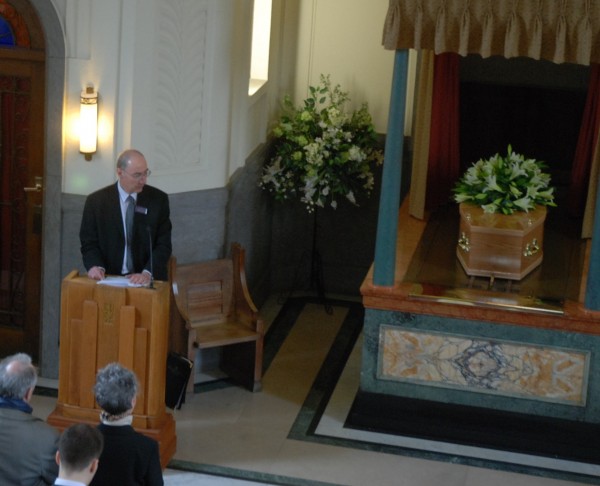
by Michael | Jan 4, 2016 | Blog
Let’s be brutally frank: it’s funeral season. And let’s face it, we’re all going to die some time …
I’m a funeral (as well as a wedding) celebrant. So here’s some guidance that may be helpful to you, when the inevitable happens.
Death
If someone dies at home (or in a nursing home), a doctor must be called to issue the Medical Certificate of Death. This will be done by hospital staff, if the deceased dies while in hospital.
Assuming there is no need for a post-mortem, etc., the next step, before arranging the funeral, is to make an appointment to see the Registrar.
Registering the Death
There are lots of choices how to commemorate a death, but, come what may, it has to be recorded legally. So the registrar will need to be informed, and will want:
- details of the death (including the Death Certificate)
- name, address, date and place of birth of the deceased
- their occupation
- whether they were receiving a pension or allowance from public funds
- if married, the date of birth of the surviving spouse.
The funeral
The Procession
Historically, a cortege was much favoured, and today you can still see horse-drawn hearses. Most commonly, though, it will be a limousine – although you can actually come across a range of creative ideas for the procession (eg motorcycle hearses, or bringing the coffin by a lorry, say, to reflect the deceased’s profession or passion).
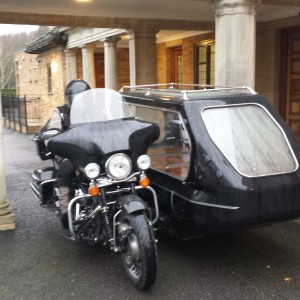
Burial
There are a number of interesting customs still in use – mostly in Wales, Scotland and Northern Ireland, where burial tends to happen sooner. Some regional traditions include the use of cords to lower the coffin (Scotland), families in Wales announce a death by pinning cards to lamp posts and there are the ‘lifts’ (Northern Ireland), where the coffin is passed from hand to hand. In England, rosemary may be placed on the coffin or at the graveside (symbolising remembrance).
It is traditional to strew soil or rose petals over the coffin, but nowadays there are new rituals, which may include live music, fireworks, release of doves, bubbles or balloons.

Cremation
Ashes can be buried, scattered or kept, so it is as well to consider these options carefully. There are various regulations about scattering or burying ashes, and a Funeral Director should be able to advise you.
The service
Music still plays a big part at a funeral, but religious music is in decline. People prefer songs associated with the deceased (or chosen by them). An organ is often an option, but usually the chapel may have a Wesley System (which can access most songs). Alternatively or additionally, CDs or MP3s are the order of the day.
Orders of service have often become more elaborate than they once were. Now, in addition to the deceased’s name, date of birth and death and the words of any hymns being sung, there may well be photographs and stories.
Speeches and Eulogies
In many cases, the person leading the service still delivers the eulogy, but increasingly family, friends and work colleagues may contribute a poem, a memory or a tribute.
Celebrant
If you use a Funeral Director, they will give you information about the funeral and should explain that you can have a full religious service, a humanist-type one (totally secular) or a part-religious funeral ( combining both elements). They will then put you in touch with the appropriate celebrant.
In most cases, the celebrant will visit and discuss the choices that may be available to you so that you can have the service that is most fitting and, hopefully, satisfactory.
Perhaps this is the moment to remind you that I offer religious, part-religious or non-religious services! I even write and prepare funerals for those who want to have a say in their funeral during their life-time.
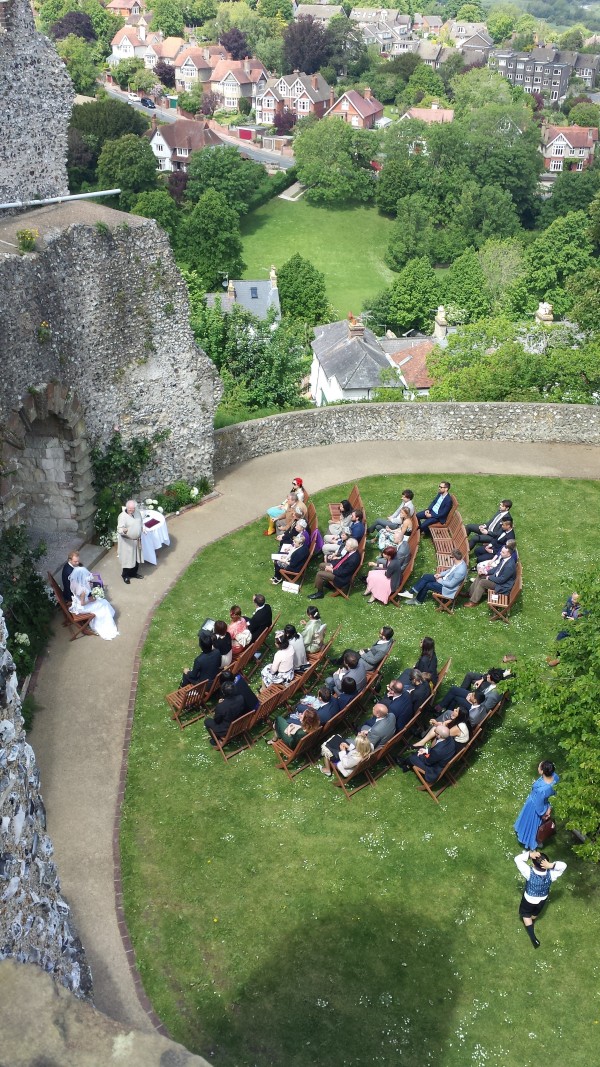
by Michael | Jul 14, 2015 | Blog
In my experience, most couples – especially the men! – don’t really know what can go into their wedding service. There are exceptions, of course, but most people have enough trouble accepting that there are alternatives to either a full religious church service or the somewhat sterile register office ceremony.
Creative ceremonies are very much a possibility, and all you actually need to ensure is that the legal formalities are catered for.
What do I mean by “creative”? Well, how long is a piece of string?
To begin with, do you plan to hold the ceremony indoors or out? How conventional do you want it? Do you want it under the sea? In a plane? Up a mountain? In a back garden? They’re all possible.
To speak fairly generally, you can hold a fairly traditional ceremony that, to all intents and purposes, looks like the wedding my grandparents would have expected (except that it might not be held in a religious edifice).
You may opt for a pagan ceremony. A handfasting will invoke nature blessings and can be most exciting.
Then there are various gradations of religiosity. You could have a few prayers and blessings, some originating from other liturgies or cultures, and of course it might be a humanist-type wedding, with no religious words at all.
A Civil Celebrant-led wedding can cover any degree of religiousness, but your choices don’t end there. There’s the language to be used (by that I mean formal or informal), there’s the music to be decided, what readings or poems will be used, and, indeed, whether you want friends or family participating.
Perhaps the element that differentiates weddings the most is the choice of ritual. I’d like to speak about this more next week, but just a few pointers as to what I am driving at.
Depending on personal beliefs and preferences, you can include rituals from your own or other religions. An East European ritual, for example, involves the couple being presented (usually by a mother) with a loaf of bread. They both bite into it simultaneously, and the person who gets more will supposedly be the head of the household!
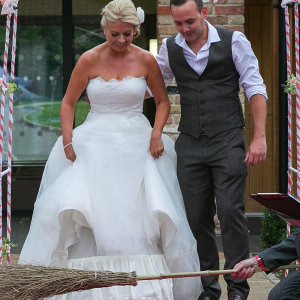
One of my favourite rituals normally comes at the end of the ceremony, is pagan, and can bring a smile to everyone’s face. It’s called “jumping the broom”, and the couple have to jump together over a besom. This symbolises sweeping out the old and bringing in the new, as they start their life together.
Some more suggestions will follow next week, but if you can’t wait till then, feel free to contact me!




 Civil Ceremony
Civil Ceremony




